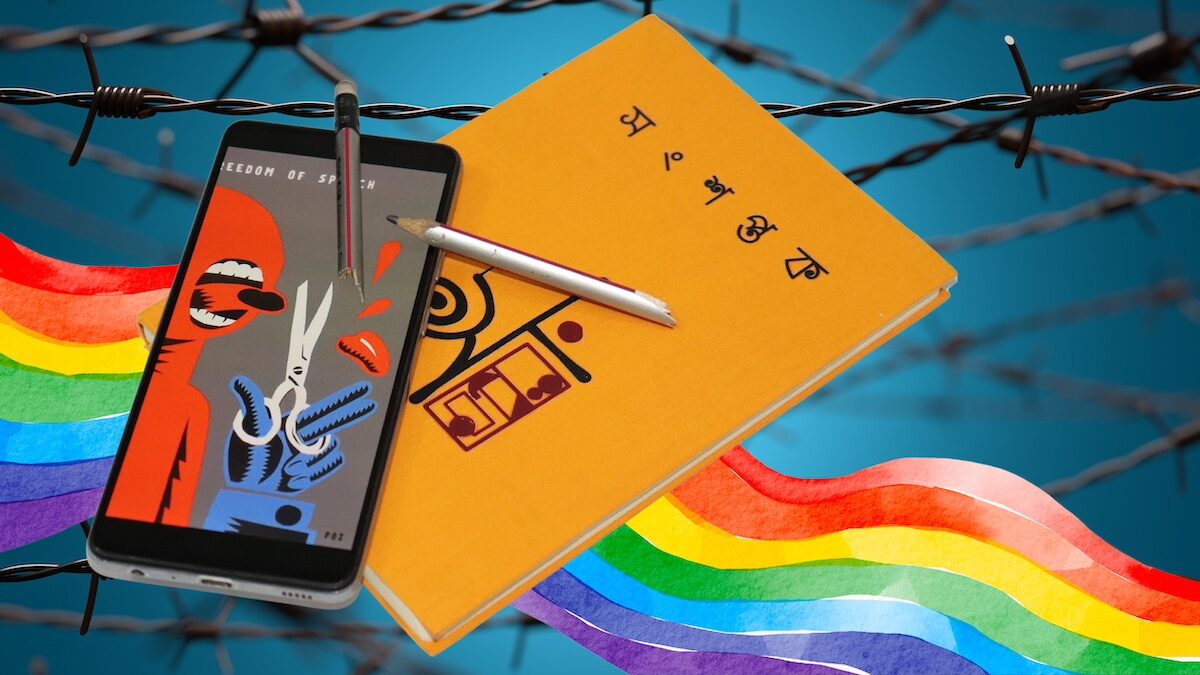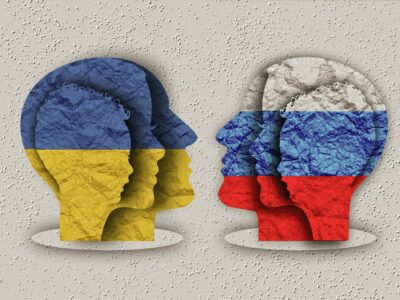
Image by Shongshoptok, used with permission.
This article by Shongshoptok was first published on EngageMedia as part of its Youth Advocacy and Communications for Internet Freedom project, which aims to expand awareness and engagement with digital rights issues among youth advocates in the Asia-Pacific. An edited version is republished here as part of a content-sharing agreement.
December 10, 2023, marked the Platinum Jubilee of the Universal Declaration of Human Rights, yet Bangladesh’s LGBTQ+ population grapples with the violation of their basic human rights. The Cyber Security Act 2023 (CSA) stands out as one of the many draconian laws passed in recent years, especially in anticipation of Bangladesh’s 12th parliamentary elections to be held on January 7. This law forces the country’s LGBTQ+ movement and population into the shadows of self-censorship.
Last November 13, the United Nations organized the 4th Universal Periodic Review (UPR) on the human rights situation in Bangladesh. In the lead-up to this event, organizations advocating for LGBTQ+ rights in Bangladesh since 2022 collaborated on a shadow report for the UPR on behalf of civil society. However, a paradox emerged after the report was prepared: under which organization should it be submitted? The legal complexities in Bangladesh and the threat to LGBTQ+ organizations make revealing their existence perilous. Fearing Section 25(b) of the CSA, we, with a general sense of apprehension, submit the shadow report using the name of a defunct organization.
In the shadows of self-censorship
I am authoring this article using an organizational pseudonym rather than my actual name. Anonymity is a common practice because of the persistent fear of the CSA. This law instills fear to the extent that domestic LGBTQ+ organizations are reluctant to create websites. When they do, the information disclosed is minimal, considering the government’s authority to shut down any website at any time using Section 8 of the CSA. Presently, only two LGBTQ+ organizations in Bangladesh have successfully established specialized websites accessible to trusted individuals through user-ID passwords.
Over the past 12 years of community-based organizing experience, I found that there exists no alternative to the internet for advancing the queer community movement within the current reality of Bangladesh. The internet is regarded globally as a fundamental human right, acknowledged through a resolution by the United Nations Human Rights Council. Bangladesh routinely imposes internet censorship, conflicting with the freedom of speech and expression enshrined in Article 39(2) of the Bangladesh Constitution. Additionally, incidents like nationwide internet shutdowns occur regularly at the behest of the government.
Our activities are not free from constraints on social media either. The government of Bangladesh has introduced the Integrated Lawful Interception System (ILIES). This technology enables law enforcement agencies to track any citizen’s precise location through the mobile network, contradicting Article 43(b) of the constitution, which promises the privacy of correspondence and other means of communication. Furthermore, Section 42 of the CSA grants law enforcement agencies the power to search and seize a person’s hardware, social media accounts, and documents, both online and offline, without a warrant, based on mere suspicion. This section, too, conflicts with Article 43(b) of the constitution. The presence of such acts and systems forces organizations and individuals advocating for LGBTQ+ rights in Bangladesh to operate under the constant shadow of fear, subjecting them to arrest, harassment, and even risking their lives.
The ominous impact of the CSA on the LGBTQ+ community
In 2021, the story of a Hijra freedom fighter was unveiled on the 50th anniversary of Bangladesh’s independence war. However, today, stating that this country belongs not only to cisgender men and women but also to the LGBTQ+ community and acknowledging that the liberation war involved the efforts of LGBTQ+ individuals could lead to punishable offences under Section 21 of the CSA.
Section 25 of the CSA severely restricts the entire advocacy and movement for LGBTQ+ rights, as it criminalises published contents that tarnish the image or reputation of the country, given that the state criminalises homosexual behaviour. This provision restricts us from sharing reports highlighting injustices faced by the LGBTQ+ community in Bangladesh on a national or international level, risking legal actions. This clause infringes upon our constitutional right to protest against injustices as citizens of the state.
In October 2023, Shongshoptok released a statement condemning UK Prime Minister Rishi Sunak’s disrespectful remarks on transgender issues. However, the government reserves the right to take legal action against the publisher of the statement under Section 27 of the Act, and can hypothetically claim that the publication of this statement caused damage to Bangladesh’s relations with the United Kingdom. This section contains ambiguous terms, such as “endangering the integrity, security, and sovereignty of the State” and “instilling fear among the people or a certain number of sections,” lacking clear definitions. If LGBTQ+ organizations and individuals engage in online campaigns advocating for their rights, they risk being identified as involved in terrorist activities under this section, potentially leading to legal repercussions.
It is evident that homosexuality or gender diversity contradicts the religious sentiments of the majority in Bangladesh. In this context, when Shongshoptok advocates for the rights of LGBTQ+ individuals, it inherently opposes the religious sentiments of Abrahamic religious groups, making LGBTQ+ people in Bangladesh vulnerable to threats from intolerant factions. The brutal murders of two LGBTQ+ rights activists in 2016 serve as a stark reminder of the dangers posed by bigoted groups. State-encouraged extremist militancy, facilitated by a de facto blasphemy law like Section 28 of the CSA, contradicts the constitutional principle of secularism outlined in Article 8. This law not only negates the standing of a significant population but also legislates against it. Section 28 has silenced LGBTQ+ voices, while Section 29 of the act hinders the LGBTQ+ community from expressing their opinions online. Moreover, it prevents them from taking a strong stance against hate crimes, propaganda, and misinformation imposed on the community by extremists. Instances of open interference by the state and influential individuals in the exercise of free speech, in gross violation of Article 39 of the constitution, have already been witnessed.
Cross-border activism and diaspora support play pivotal roles for any oppressed nation or community. Section 4 of the CSA poses a significant threat to Bangladeshi LGBTQ+ individuals residing abroad. Due to these restrictive laws, our cross-border activism and diaspora support have come to a halt.
An extra toll on Hijra, Adivasi, and marginalized LGBTQ+ communities
The LGBTQ+ community in Bangladesh, faced with social and legal risks, often resorts to using fake IDs to communicate online. Grassroots LGBTQ+ individuals who may not be well-versed in the law, including Hijra and Adivasi LGBTQ+ people, frequently manage social media accounts with images of iconic characters. Hijra, transmen, and transwomen express their identities by dressing according to their gender, challenging societal norms, and embodying their desired identities, a practice often referred to as cross-dressing in our cis-normative society. Forms of self-expression are vital to the LGBTQ+ community and can be interpreted as violating Section 24 of the CSA. This section echoes the abolished colonial-era Section 26 of the Criminal Tribes Act of 1871.
The majority of the Hijra community in Bangladesh lacks primary education, while Adivasi LGBTQ+ individuals, both in the hills and plains, struggle to meet their basic needs. These Adivasi LGBTQ+ communities face deprivation of essential services, including education, mirroring the plight of lower-class LGBTQ+ individuals. Despite their use of social media, their lack of digital literacy leaves them vulnerable. In this reality, criminals can exploit digital devices for illicit activities under Sections 17 to 37 of the CSA, including hacking and unauthorized use of devices. If someone else orchestrates a crime using the device of these LGBTQ+ individuals, the innocent may face punishment under Section 33 of the CSA. They are left with the arduous task of navigating the legal process before their innocence is proven, and the challenges posed by Bangladesh’s legal framework and judicial process are evident.
Since the passage of the Digital Security Act in 2018, LGBTQ+ rights organizations in Bangladesh have consistently demanded the repeal of laws like the Cyber Security Act that enable undemocratic practices and human rights abuses. In addition, strict laws and legal restrictions in Bangladesh prevent organizations like Shongshoptok, working for LGBTQ+ rights, from obtaining official registration, hindering our advocacy efforts.



